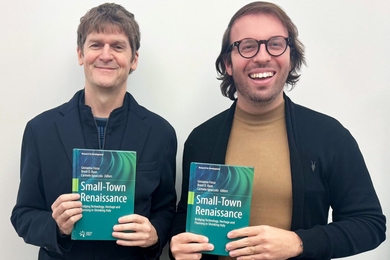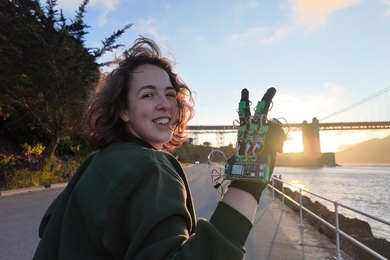Lisa Peattie, a celebrated scholar and a lifelong activist who was a professor emerita of urban anthropology in the Department of Urban Studies and Planning and recipient of the ACSP Distinguished Educator Award, passed away on Dec. 13, 2018. She was 94.
Peattie was born in Chicago and raised in Illinois, Mexico, and Guatemala. Her international upbringing amid her parents’ fieldwork in Morelos and Yucatán, Mexico, nurtured an early interest in the connections among academic disciplines.
She studied anthropology at the University of Chicago, earning her doctorate in 1968.
Peattie joined the MIT faculty in 1963 with the goal of pushing anthropology out of the realm of pure social science and into the arena of action and advocacy, by including the researcher’s moral positions and the interests of the individuals being studied. She was one of the first female faculty members to gain tenure at MIT.
In 1962 Peattie and her husband, Roderick Peattie, moved to South America to help document the efforts of the MIT-Harvard Joint Center for Urban Studies to plan a new city in the interior of Venezuela. Her experiences in the field and her observations of the difficulties faced by those living at the margins of the new city led to her pathbreaking book, “The View from the Barrio” (University of Michigan Press). The volume raised planners’ awareness of the way that the plans they imagined actually affected people at the margins.
“Lisa was an unorthodox urban anthropologist who strongly believed that governmental interventions in the lives of the urban poor usually reduce the autonomy of the poor,” says Bish Sanyal, the Ford Professor of Urban Development and Planning. “She came to this conclusion by living with the poor and by observing from below how poor families coped with socioeconomic changes.”
Following the death of her husband in 1963, Peattie returned to Boston to teach full time at MIT. During her career at the Institute, Peattie remained a tenacious activist, protesting frequently against the Vietnam War during the 1960s and early 1970s, against nuclear proliferation in the 1980s and 1990s, and most recently as part of the Occupy movement in the early 2010s.
In 1966, she was part of the original group of students and faculty from MIT and Harvard that created Urban Planning Aid (UPA). This organization was the first advocacy planning firm in America. Peattie and her colleagues offered technical assistance and promoted empowerment in low-income communities faced with housing, health, safety, and representation challenges. UPA helped residents of Boston and Cambridge halt the proposed construction of the Inner Belt highway, fight evictions. and prevent the demolition of housing.
“Lisa was my professor at MIT in both the MCP program and later for my PhD,” says Anna Hardman MCP ’71, PhD ’88. “I learned so much from Lisa’s insight, ideas, and enthusiasm‚ and from her commitment to important causes‚ lessons I re-learned when I worked for Urban Planning Aid in the 1970s. Lisa was wise, always thoughtful, and her contribution to women in the Department of Urban Studies and Planning was vital.”
In 1999, the Association of Collegiate Schools of Planning presented Peattie with the profession’s highest teaching honor, its Distinguished Educator Award. The award recognized her scholarly accomplishments as well as the impact of her work as an applied anthropologist and activist.
Peattie raised four children: Christopher Peattie (husband of Denise Hood), who predeceased her in 2011; and Sara Peattie, Miranda Clemson, and Julia Peattie. She also leaves two grandchildren, Chris Clemson and Ella Beaver. She is survived by her brother, James Redfield, and his wife, Kathy Atlass.
“Widowed young in a foreign country with four children, our mother continued to approach life with zest and courage, traveling overland up the Pan-American Highway from Panama to New England in a Jeep with her children and a parrot,” say her daughters. “Our mother was a woman capable of enthralling a class of graduate students, planting a vegetable garden, baking bread, and painting the bedroom ceiling all in the same day. Often exasperating, she was never dull. She threw great parties and was a mean dancer. In later years her body flagged but her spirit, never. Her curiosity about the world never dimmed.”






